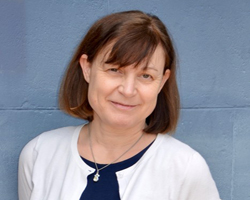Dr Christa Kuderna, paediatrician, Vienna, Austria

WHO
Christa Kuderna
Every day, Dr Christa Kuderna sees more than 80 children coming into the children’s ward of one of the biggest public hospitals in Vienna.
Dr Kuderna is a paediatric gastroenterologist. For the past 30 years, she has been stressing the importance of immunization for children’s health, both in her capacity as a medical doctor and in her role as a member of the Austrian National Certification Committee for Poliovirus Eradication and in several research functions.
Every visit an opportunity
The waiting room is full – everyone is patiently waiting for their turn to finally see the doctor. When a child is asked to enter the patient room, Dr Kuderna takes a thorough look at the child following a standard procedure, ranging from measuring temperature to checking blood pressure and respiratory function. The physical examination of each child goes hand in hand with a detailed conversation with the parent or caregiver – this provides a valuable opportunity to discuss immunization. No matter which health issue or illness prompted the hospital visit, Dr Kuderna always makes sure to thoroughly check the child’s immunization status. Dr Kuderna says, “Knowing whether a child is fully vaccinated is not only important regarding their level of protection against vaccine-preventable diseases, but also their overall health status. Immunization status plays an essential role in the overall treatment of a child”.
Countering vaccine hesitancy through two-way communication
When asked about vaccine hesitancy, Dr Kuderna stresses: “Most parents I see in my day-to-day routine at the hospital who express concerns regarding vaccination are not hard-liners who completely refuse vaccines. I have very seldom experienced parents who are completely opposed to vaccinating their child. The rest of the so-called hesitant parents I have met, express specific concerns and fears regarding vaccination. They sometimes lack access to evidence-based information or have been confronted with rumours and then come to me for advice. I believe it is part of my job to listen to these concerns, take them seriously and then inform them about the facts regarding vaccination”. She considers listening to her patients to be one of the main pillars of a successful patient–doctor relationship.
Dr Kuderna explains: “Once a mother came to me, who was very concerned about the MMR [measles, mumps, rubella] vaccine, as she had heard rumours from one of her friends. I did not want to immediately swamp her with information and decided to simply listen to what she had to say. When she had finished speaking, she sighed, realizing that what had caused her hesitancy was not the vaccine, but rather the feeling of not being well-informed to make the best decision for her child’s health. The mother said it was the first time that any doctor had truly taken the time to hear her out”. Upon receiving information on the benefits of vaccination, the mother said, “Of course I will vaccinate my daughter”.
“Most parents only seek my medical advice and wish to be better informed and educated about immunization, as there is too much misinformation on social media and the web in general that they do not want to trust…,” says Dr Kuderna. “Truly listening to and understanding my patients’ concerns has helped me to better convey the benefits and importance of vaccination.”
Protecting the most vulnerable
Dr Kuderna further stresses the importance of vaccination as a shared responsibility: “As a paediatrician, I also work with children who cannot be vaccinated either due to an immunodeficiency or because they are too young. As the vaccine against measles is only given from 9 months on, these babies depend on the protection of others, through a concept known as herd immunity…. The importance of herd immunity was recently heavily discussed across Austrian media channels, when a 15-year-old unvaccinated boy spent hours in the waiting room of a hospital without knowing that the heavy cough which had prompted him to seek professional help was measles. Subsequently, more than 28 babies under the age of 1 year, who had come close to the boy, were admitted to hospital for preventive measures, as they were suspected of also having contracted the disease. Herd immunity only works if everyone eligible is also vaccinated”.



